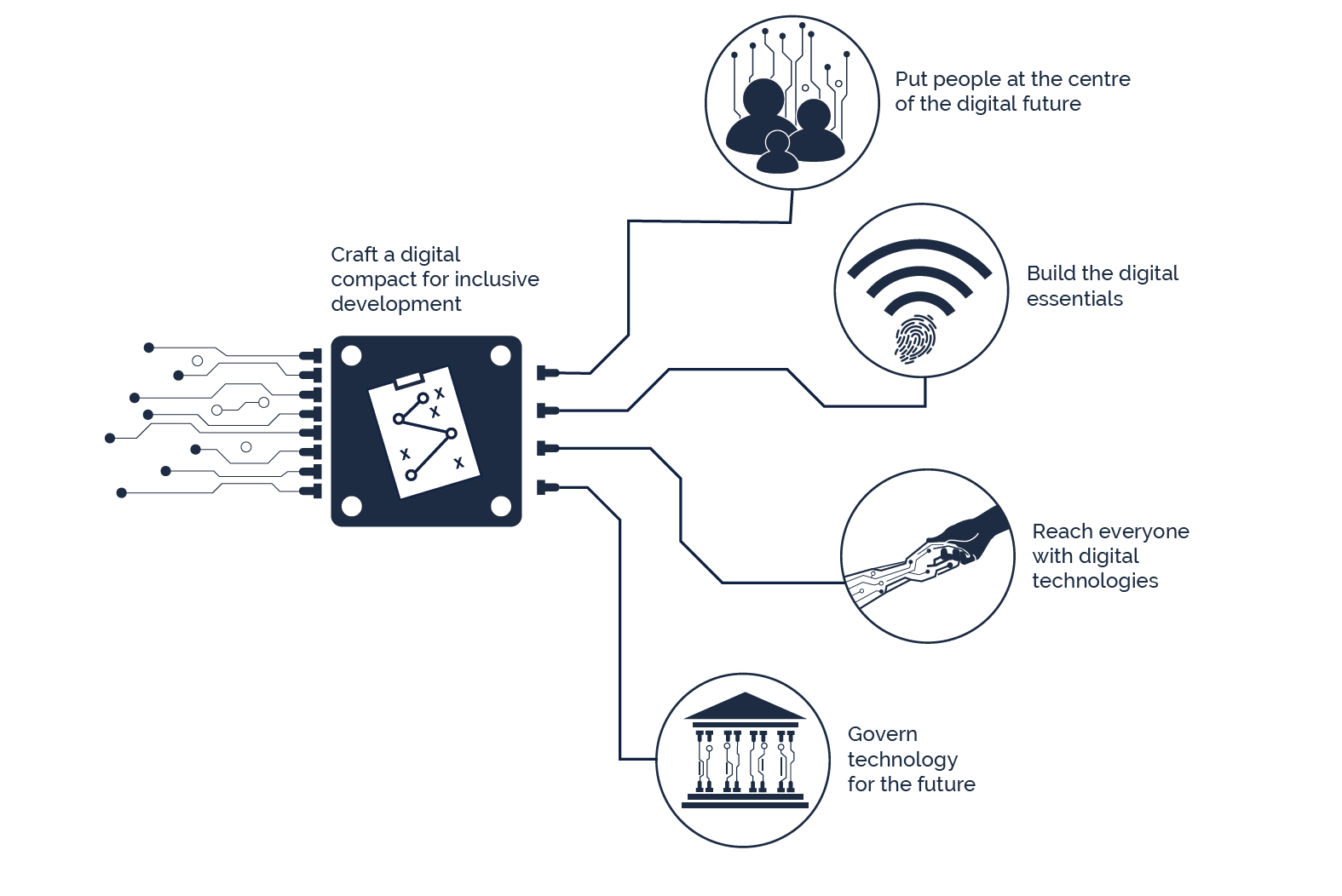Sci & Tech
Billionaire Strive Masiyiwa On Using Digital Technologies To Grow Businesses and Nations

The first Dollar Billionaire in Zimbabwe, 58-year-old Strive Masiyiwa who, according to FORBES estimates has a net worth of $2.8 billion, has said that Digital technologies present opportunities for developing nations to build new industries and deliver better services.
Earlier this week, Pathways for Prosperity released a report( that we have highlighted in this article) ascertaining that only 30 per cent amongst 80 per cent of people in developing countries who live under a cellular network have ever used the internet.
Speaking during the launch of the report, Billionaire Strive Masiyiwa, who’s also the Econet’s founder said that;
“Digital technologies offer powerful tools to grow businesses and nations, enabling entrepreneurs to access markets and gives governments innovative ways to deliver better services.”
In the report titled The Digital Roadmap: how developing countries can get ahead— 26 recommendable steps on how nations can use to harness new technologies to deliver development to their citizens are highlighted.
Here is the report courtesy of Pathways for Prosperity.
Key Findings
This is a critical moment in history. Some countries will prosper in a new global digital economy, but countries that are not ready will risk being left behind.
Countries have the agency to act now. The Digital Roadmap identifies five priority areas for countries to create their own digital future.
Technology will not guarantee success, no matter how innovative it is. Just as important as new technology is the social and economic environment in which technology is used.
Technology will almost always be a force for growth, but technology is not automatically a force for inclusion. Without a ddeliberate effort to include everyone, digital technologies can end up entrenching existing inequality.
Government, civil society and the private sector should come together to craft a shared national vision. Everyone has a role to play in major economic transformation.
With new digital technologies come opportunities for low and middle-income countries to diversify their economies, create new jobs, transform agriculture, and improve health and education. But digital technologies can also entrench exclusion and disrupt peoples’ livelihoods. This report, based on two years of research and analysis, is underpinned by learning and extensive engagement with policymakers, entrepreneurs, civil society and academics from around the world.

The Digital Roadmap presents an overarching vision for a globally connected world that both delivers on the opportunities presented by technology and limits downside risks. Importantly, it also sets out how this vision can be achieved.
Craft a Digital Compact for Inclusive Development
Embracing country-wide digital change will be disruptive. Navigating it requires coordinated action. Reconfiguring an economy will result in some resistance. The best way to achieve buy-in, and to balance trade-offs, is through dialogue: the private sector and civil society in its broadest sense (including community leaders, academia, trade unions, NGOs, and faith groups). The political economy of upheaval is difficult, but change can be managed with discussions that are inclusive of multiple groups. These dialogues should result in a national digital compact: a shared vision of the future to which everyone commits. The Pathways Commission has supported three countries – Ethiopia, Mongolia and South Africa – as they each developed country-wide digital strategies, using the Digital Economy Kit.
Put People at the Centre of the Digital Future
Rapid technological affects peoples’ lives. Failure to put people at the centre of social and economic change can lead to social unrest. The pace and intensity of change means it’s all the more important that people are at the centre of the digital future – not the technology. This requires equipping people to benefit from opportunities, while also protecting them from the potential harms of the digital age. Governments should take responsibility for ensuring that vocational education is truly useful for workers and for business in the digital age. The private sector needs to be involved in keeping curricula up to date.
Build the Digital Essentials
Digital products and services cannot be created in a vacuum – essential components need to be in place: physical infrastructure, foundational digital systems (such as digital identification and mobile money), and capital to invest in innovation. These are the basic ingredients needed for existing firms to adopt more productive technologies, and for digital entrepreneurs to build and innovate. Having reliable infrastructure and interoperable systems means that firms and service providers can focus on their core business, without having to build an enabling environment from scratch.
Reach Everyone with Digital Technologies
If technology is to be a force for development for everyone, it must reach everyone. Just over half of the world’s population is connected to a digital life; for the rest, digital opportunities don’t mean much. Without digital connections, people can’t participate in digital work platforms, benefit from new technologies in education, or engage with government services online. Women, people with lower levels of education, and people in poverty are usually those who lack digital access. Reaching everyone requires looking beyond current business models. The private sector needs to design for inclusion, ensuring the poorest and most marginalised consumers, to ensure they are not left even further behind.
Govern Technology for the Future
The unprecedented pace of change and the of new risks in the digital era (such as algorithmic bias, cybersecurity, and threats to privacy) are creating headaches for even the most well-resourced countries. For developing countries, the challenges are even bigger. Digital technologies fundamentally shape what people do and how they do it: freelancers may face algorithms that determine chances to get hired. Banks might face a financial system with heightened risk from new, non-bank deposit holders. These issues and many others require new and adaptive approaches to decision-making. Emerging global norms will need to consider the needs of developing countries.
The Pathways for Prosperity Commission works to create conversations and to encourage the co-design of country-level solutions aimed at making frontier technologies work. The commission’s efforts are aimed at helping the world’s poorest and most marginalised men and women.
Pathways Commission reports that it has piloted the Digital Economy Toolkit in Ethiopia, Mongolia, and South Africa as a foundation for their national digital strategies. The panellists at the launch insisted on training on 21st-century skills to accommodate Africa’s growing labour force. According to research, it is estimated that by 2030, the labour force will grow by 285 million.
The billionaires also urged the governments to develop a ‘National Digital Compact’ to guide digital transformation and navigate the impacts that technologies are having on their societies and economies.
In Kenya for instance, such a move will mean empowering citizens with digital skills, giving them access to digital platforms, and providing a social safety net for those whose livelihoods are disrupted by technological change. Not imposing useless social media tax or registering social media users so that the government can dictate what Netizens have, are and will be doing on their independent platforms.
*Additional reporting by Pathways for Prosperity*
Kenya Insights allows guest blogging, if you want to be published on Kenya’s most authoritative and accurate blog, have an expose, news TIPS, story angles, human interest stories, drop us an email on [email protected] or via Telegram
-

 Grapevine1 day ago
Grapevine1 day agoAlleged Male Lover Claims His Life Is in Danger, Leaks Screenshots and Private Videos Linking SportPesa CEO Ronald Karauri
-

 Lifestyle4 days ago
Lifestyle4 days agoThe General’s Fall: From Barracks To Bankruptcy As Illness Ravages Karangi’s Memory And Empire
-

 Americas1 week ago
Americas1 week agoEpstein Files: Bill Clinton and George Bush Accused Of Raping A Boy In A Yacht Of ‘Ritualistic Sacrifice’
-

 Business2 weeks ago
Business2 weeks agoCooking Fuel Firm Koko Collapses After Govt Blocks Sh23bn Carbon Deal
-

 Business1 week ago
Business1 week agoABSA BANK IN CRISIS: How Internal Rot and Client Betrayals Have Exposed Kenya’s Banking Giant
-

 Investigations6 days ago
Investigations6 days agoEpstein Files: Sultan bin Sulayem Bragged on His Closeness to President Uhuru Then His Firm DP World Controversially Won Port Construction in Kenya, Tanzania
-

 Business1 week ago
Business1 week agoKRA Can Now Tax Unexplained Bank Deposits
-

 News1 week ago
News1 week agoAUDIT EXPOSES INEQUALITY IN STAREHE SCHOOLS: PARENTS BLED DRY AS FEES HIT Sh300,000 AGAINST Sh67,244 CAP

























